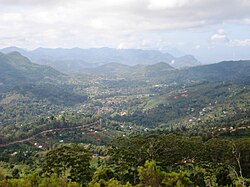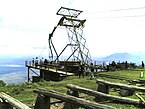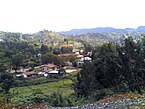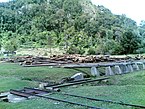Lushoto District, Tanga
Lushoto
Wilaya ya Lushoto (Swahili) | |
|---|---|
| Wilaya ya Lushoto, Mkoa wa Tanga | |
 Aerial view of Lushoto | |
 Location within Tanga. | |
| Country | |
| Zone | Northern |
| Region | Tanga |
| Seat | member of parliament |
| Government | |
| • District Commissioner | Majidi mwanga (shabani omari shekilindi) |
| Area | |
| • Total | 3,297 km2 (1,273 sq mi) |
| Population (2022) | |
| • Total | 350,958 |
| • Density | 110/km2 (280/sq mi) |
| Time zone | UTC+3 (EAT) |
| Postcode | 217xx |
| Area code | 027 |
| Website | District website |
Lushoto is one of the eleven districts of Tanga Region in Tanzania. It is bordered to the northeast by Kenya, to the east by the Muheza District, to the northwest by the Kilimanjaro Region, west by Korogwe District and to the south by the Bumbuli District. The district's capital and largest town is Lushoto.
History
[edit]It was formerly known as Wilhelmstal (William's Valley) and was named after Emperor Wilhelm II.
During the German colonial period from the 1890s to 1918 the area was popular with settlers, hence the German place name of Wilhelmstal. Large farms and plantations were created, and the district was valued for its pleasant mountain climate. Numerous church missions were, and remain, active.
Between 1893 and 1911 the German Ostafrikanische Eisenbahngesellschaft (East African Railway Company) constructed an important railway line starting at Tanga on the coast and passing along the Usambara Mountains with a station at Mombo, about 20 kilometers (12 mi) from Wilhelmstal, to "New" Moshi at Kilimanjaro. The initial plan of the Usambarabahn was to connect the port of Tanga with Lake Victoria by passing south of the Usambara Mountains. This was in direct competition with parallel British efforts in colonial Kenya. From 4 June 1912 to 12 May 1913 the line was renamed Nordbahn (Northern Railway).
According to the 2002 Tanzania National Census, the population of the Lushoto District was 419,970.[1] By 2012, the population had increased to 492,441.[2] In 2016, Lushoto district was separated from Bumbuli District there to population of Lushot as of 2012 was 332,436.[3] In 2022, the population was 350,958.[4]
Administrative subdivisions
[edit]Wards
[edit]As of 2012, Lushoto District is administratively divided into 28 wards:[2][5]
- Lushoto
- Gare
- Kwai
- Ubiri
- Mtae
- Sunga
- Rangwi
- Mnazi
- Lunguza
- Mbaramo
- Mng'aro
- Mlalo
- Mwangoi
- Shume
- Malindi
- Hemtoye
- Malibwi
- Mlola
- Makanya
- Ngwelo
- Kilole
- Kwekanga
- Lukozi
- Manolo
- Dule M
- Kwemshasha
- Ngulwi
- Kwemashai
Gallery
[edit]-
The Usambara Mountains.
-
The cable Yarding System at Shume.
-
Lushoto in the Tanga Region.
-
Lumbering
-
Harvesting tea leaves at Bumbuli plantation.
-
A house
-
Local jogging club.
-
Bus between Lushoto and Lukosi.
References
[edit]- ^ Lushoto demography[permanent dead link]
- ^ a b "Census 2012". National Bureau of Statistics. Archived from the original on 5 March 2016. Retrieved 9 December 2015.
- ^ https://lushotodc.go.tz/storage/app/uploads/public/5a0/b0a/548/5a0b0a5485966968107954.pdf [bare URL PDF]
- ^ "Tanzania: Administrative Division (Regions and Districts) - Population Statistics, Charts and Map". www.citypopulation.de. Retrieved 2024-02-11.
- ^ https://lushotodc.go.tz/storage/app/uploads/public/5a0/b0a/548/5a0b0a5485966968107954.pdf [bare URL PDF]









